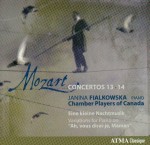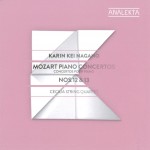
 Mozart – Piano Concertos 12 & 13
Mozart – Piano Concertos 12 & 13
Karin Kei Nagano; Cecilia String Quartet
Analekta AN 2 8765
Mozart – Piano Concertos 13 & 14
Janina Fialkowska; Chamber Players of Canada
ATMA ACD2 2532
The piano concertos featured on these two recordings may not be largely known to most audiences. After all, Mozart wrote 27 piano concertos and many later ones appear to be more dazzling and exciting. However, concertos Nos.12, 13 and 14 were written at the time when Mozart himself entered a very prosperous and exciting stage in his life; he had just moved to Vienna, thus acquiring more independence from his father, married Constanze Weber, and began developing entrepreneurial spirit by generating revenue from public performances and sales of his new compositions. These piano concertos, written in 1782 (Nos.12 and 13) and in 1784 (No.14), reflect the forward momentum of Mozart’s life as well as some nostalgic elements and a subtle homage to Johann Christian Bach and Joseph Haydn in the middle movements. In an attempt to promote his work, Mozart wrote two versions of these concertos: the orchestral version (strings and woodwinds), meant for concert halls, and the chamber one, making them more accessible to amateur musicians.
It is the more intimate, “a quattro” version that is presented on both recordings. The absence of the horns is arguably bothersome to some but it is my opinion that the chamber rendition offers nuance and clarity in phrasing that otherwise may not be heard and works just as well. Pianist Karin Kei Nagano and the Cecilia String Quartet dive into the intimate textures and colours by emphasizing the simplicity of Mozart’s music. Cecilia Quartet uses vibrato with the clear intention of enhancing the sound, making the phrasing appear fresh and exciting at times. Karin Kei Nagano brings youthfulness and certain sweetness to her interpretation – her notes are light, spirited and virtuosic in a very natural way.
The Chamber Players of Canada and Janina Fialkowska included the double bass in the string ensemble thus achieving a warmer overall sound. Fialkowska’s playing is fierce at times yet wonderfully lyrical. She does not shy away from darker piano colours in the concertos but emphasizes innocence and brightness in Ah, vous dirai-je, Maman. The string ensemble playing is intense and elegant. Eine kleine Nachtmusik has a reputation of being the party piece in the classical music world – the Chamber Players of Canada clearly enjoyed playing it and they did so with a high degree of stylishness.



